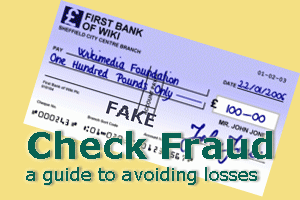
• Home •
Victimīs Story •
Fraud Prevention •
Project GSO •
Hall of Shame •
LINKS •

Work at Home Scams Part VII!
Beware of scams!
Scam Alert - Evaluating "Opportunities"
Online job seekers are warned by the Better Business Bureau to beware of misleading job postings and ID theft scams.
Online job scams usually target people who want to work from home. But they may also target people who want second jobs or young people who want to work part-time.
Complaints received by the Better Business Bureau include jobs posted on such well-known sites as Monster, CareerBuilder and Yahoo Hot Jobs. The fraud offers appear almost as quickly as screeners can remove them.
No professions or positions seem to be immune from these scams. Victims report they've been scammed through posting their resumes and replying to job ads.
Some of the scams are associated with mystery shoppers, IT assistants, quality control administrators, export/import specialists and processing payment orders for overseas companies.
One thing that may give the job away as a scam is when the employer isn't interested in meeting the potential employee. There's no interview and no invitation to the place of business.
In one instance, a job seeker responded to an email after posting an online resume. The job was supposedly with BKL Security in Madrid, Spain to process orders. The tip-off for the scam was when employees were asked for access for their checking accounts to handle money orders.
The Better Business Bureau found the address in Madrid was a hotel. The contact person was associated with DNB Security and DFT Security in Italy, which have the same job scam offer.
If you're looking for a job, don't take any employment offers that include:
Using your bank account: Never agree to deposit checks or money orders or to have money wired into your account. And don't forward money from your account to another, even if you're promised you'll be reimbursed. The checks will be counterfeit and the wire transfers will be rescinded.
Paying money out of your pocket: You don't have to pay a fee to learn the details of a job, get job placement help, get a background screening or accept a job offer.
Re-shipping products: Stolen credit cards are often involved. Victims spend their money to re-ship products and they're reimbursed with counterfeit checks or money orders.
Giving out private information: Legitimate businesses don't ask prospective employees to give their birth dates, Social Security numbers or copies of driver's licenses or passports.
Interest from countries across the border: Offers from businesses outside the U.S. and Canada can be suspect and they're much harder to investigate.
To protect yourself if you're job hunting online, don't include your Social Security number, birth date or college graduation date in online resumes.
Consider posting your resume anonymously instead and giving an email address as your primary contact, rather than your home address and phone number.
Scam Alert
Work-at-home opportunities are big business for scam artists. Each year over billions of dollars is lost to scams. You can protect yourself by learning how to evaluate opportunities, knowing what are the most common scams you will run into, and using consumer protection resources. This page provides general information on how to protect yourself.
Evaluating "Opportunities"
You are reading an e-mail or magazine ad that promises to help you make good money working at home. Or your neighbour invites you to a "meeting" to learn about a new way to "leverage time and money". They all sound so tempting and convincing. So how do you know which deals may be legit and which arenít? Here are a few rules of thumb to consider when tempted by work-at-home schemes:
1. If it sounds to good to be true, it probably is. Avoid any program that will "do the work for you" or gives grandiose income claims.
2. Avoid any company that doesnít have a street address (not P.O. Box) and phone number.
3. Envelope stuffing and assembly work....stay away from it. I havenít run into anyone yet who hasnít lost money on these.
4. I tend to avoid work-at-home job ads in which the email address is not to the domain name of the site. For example, when you email Work-At-Home Success, your mail is sent to: success@workathomesuccess.com . Some job announcements are sent to a commercial account such as AOL or Yahoo. Anybody with a legitimate job to offer over the internet will have an email address with their company's domain name... not a commercial account (unless of course it is AOL or Yahoo offering the job).
The same goes for Website URLs. Any websites listed at free hosting sites such as Angelfire, Geocities, and Freeyellow, should be carefully investigated. Any company that can't afford its own website with domain name can't afford to hire you!
5. NEVER SEND MONEY TO GET A JOB. Is isn't uncommon to invest money in a home business but if you are responding to a job announcement, don't send money. Legitimate employers never charge to hire you. The non-legitimate company will tell you to send money to cover the cost of materials or to process your application. Don't believe it. You wouldn't pay for training or paperclips at your current job would you? These companies usually aren't offering jobs, just information on how to scam others or how to start a business.
6. Have you ever noticed that some ads are very appealing but, never indicate what exactly the program entails? Stay away from any company whose ad doesnít come right out and tell what it is offering. How good can a program be if it relies on hype in stead of a good quality work-at-home program?
7. If you are looking for a home-based job from your classified ads, 800 numbers should raise a red flag. Most local companies don't use 800 numbers in local ads. If you decide to call, and it sounds like a "job" situation, get as much information as possible so you can research the company. And remember, never send money.
8. What about infomercial opportunities such as Carlton Sheets, Brad Richdale, or Jeff Paul? To be honest, they do provide legitimate information on building your own business BUT, most of the information they provide you can get for FREE or at least cheaper at the library or local book store.
9. Network marketing opportunities abound. Over the past few years, MLM has begun to recover from the negative association with pyramid schemes. While the hierarchy is a pyramid in shape (come to think of it, all businesses are!), network marketing is a legitimate business opportunity IF the main purpose is to market products.
You can feel safe in joining the companies that are well-known such as Amway, Mary Kay, Discovery Toys, Shaklee and others. Even so, it always pays to research any business opportunity. Be sure you understand the compensation plan and any refund policies. See below for information on how to investigate companies.
10. Always "sleep-on-it". Many business opportunities can get you so excited about the possibilities that you end up writing a check without thinking. Always leave your checkbook and credit cards at home! Put the magazine ad away for a day or two. Turn off the t.v. You wonít miss out. The ads are run all the time. If you decide to pursue it, it will still be there.
11. Watch out for Home Business Associations and Home Business Seminars. They have been investigated by the Federal Trade Commission mostly for misrepresenting earning potentials to consumers. That's enough to keep me away. See number 7 if you feel tempted.
Protect Yourself
You have some ideas on how to weed out the scams from the legitimate work-at-home opportunities but there is more you can do to prevent being a victim of a scam and recoup your loss if you are scammed.
First, consider the above information before doing anything. If you think you might have a viable opportunity, do the following:
1. Contact the Better Business Bureau located in the area the company is located. Look in the phone book for the area code and call (area code) 555-1212 for long distance information to get the local BBB phone number. Or visit the Better Business Bureau on-line. Remember though that just because a company isn't listed doesn't mean it's legitimate.
2. Visit the Federal Trade Commission on-line for its consumer protection information on money-making schemes. You can also file complaints if you have been scammed.
3. Contact the Attorney Generalís Office in the state in which the company is located.
4. Get references, lots of them, and call them all. Be aware that some references may be bogus. Some scam organizations have people giving false references.
5. See what you can find on the Internet. You can do searches and participate in message boards.
6. NEVER PAY BY CHECK ONLINE! If the company only does checks online, that should be a tip off. (In fact, if any work-at-home opportunity only takes cash or check... think twice). Once you give your checking account information to someone else, you are vulnerable to having more funds withdrawn. The only recourse if that happens is to close the account. If this has happened to you, contact your bank and file a fraud report. Sometimes your bank will re-reimburse your money but not always.
7. Pay with credit card not a debit or check guarantee card. Credit card companies offer greater ease of getting your money back if you are a victim of fraud and can give you a charge-back if the company isn't co-operating. Further, you are usually liable for only $50 when your card is lost or stolen. That kind of safety may not be offered with a debit or check guarantee card.
8. Any doubts? Donít do it!
© 2006-2010 by GSO • Contact